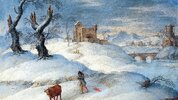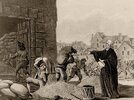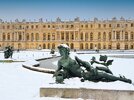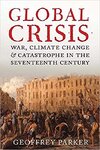This merciless winter claimed the lives of many Europeans and disrupted two major wars. The extreme cold of that year encouraged the spread of the virus throughout Europe.

Source (French): National Geographic

It took only one night in 1709 for the climate to change. On 5 January, temperatures plummeted, not surprisingly in the early hours of winter in Europe, but 1709 was no ordinary cold snap. The next day the sun rose over a continent frozen from Italy to Scandinavia and from England to Russia, the day after that, and then every day for almost three months.
The extreme cold caused food shortages that killed hundreds of thousands of people in France alone. It froze lagoons in the Mediterranean and changed the course of a war. From a shivering England, the philosopher William Derham wrote: "Never in living memory have we known a winter so severe.
THE FRENCH EXCEPTION
The country most affected by the terrible cold snap was undoubtedly France. The year 1709 had already started badly. The French peasants had to cope with poor harvests, heavy taxes and the enlistment for the War of the Spanish Succession. The cold spells endured at the end of 1708 were nothing compared to the plummeting temperatures of the night of 5-6 January. For the next two weeks, snow fell on France and the thermometers showed temperatures of around -20°C.
With no weather forecasts, the authorities had no time to prepare for what is now known as the Great Winter. Thousands of people died of hypothermia before measures were taken to help citizens. Other victims of these extreme conditions were animals killed by frost in their pens, stables or hen houses.
Throughout France, rivers, canals and ports were frozen and roads blocked by snow. In the port of Marseille and at various points on the Rhône and Garonne rivers, the ice supported the weight of carts, making it about 28 cm thick (11 Inch). In towns without supplies, there are accounts of people being forced to burn their furniture to keep warm. In Paris, supplies were suspended for three months.
Even the wealthiest people who thought they were safe from starvation with their stocks of food and drink soon realised that the cold made them unusable. Bread, meat and some alcoholic drinks simply froze. The only liquids left were spirits such as vodka, whisky and rum. The icy trap of the climate closed in on the poor and the rich alike. The vast mansions of the elite with their large windows, designed to impress but without any practical consideration, let in a chill air.
In Versailles, Elisabeth-Charlotte of Bavaria, Duchess of Orleans and sister-in-law of King Louis XIV, wrote to the Duchess Sophie of Hanover: "It is so terribly cold that it cannot be expressed. I am sitting in front of a blazing fire, there is a screen in front of my door, which is closed, so that I can sit here with a fur around my neck and my feet in a bearskin, but I am still shivering and can hardly hold my pen. I have never known such a winter, the wine is freezing in the bottles."
The government of Louis XIV had to face a catastrophic food crisis caused by the extreme cold. A special commission was set up to distribute grain as a matter of urgency. It was chaired by Henri-François d'Aguesseau, pictured in the engraving above. Great evils require great remedies: anyone caught stocking up on grain risked being sentenced to forced labour in the galleys or even execution.
A WHITE COAT
In the rest of Europe, too, the strange consequences of the cold appeared. Many witnesses told how the sudden drop in temperature weakened what was perceived as robust. Tree trunks broke with a clatter, as if an invisible woodcutter was working to cut them down. Church bells cracked instead of ringing.
In London, where it was later called the Great Frost, the Thames was frozen over. The canals and harbour of Amsterdam suffered a similar fate. The Baltic Sea froze for four long months and travellers were said to have crossed it on foot or horseback from Denmark to Sweden or Norway. Almost all the rivers in northern and central Europe froze, even the hot springs in Aachen. Heavily laden carts made their way across the frozen lakes of Switzerland and wolves prowled the villages in search of food, sometimes preying on the frozen villagers.
The poor died in their slums and the rich shivered in their castles, as in Versailles, where the Duchess of Orleans 'struggled to hold her pen'.
In the Adriatic, many ships were trapped in the ice and their crews died of cold and hunger. In Venice, people used ice skates instead of the traditional gondolas to walk around the city. Rome and Florence were cut off by heavy snowfalls. In Spain, the Ebro River was covered in ice and even the gentle Valencia saw its olive trees annihilated by the cold.
These extreme weather conditions also had an impact on politics. The conflict between France and Great Britain in the War of the Spanish Succession was suspended until the warm weather returned. More importantly, the freezing temperatures would have contributed to Russia becoming a regional power. Indeed, while historians consider Peter the Great's Russian victory over Sweden at the Battle of Poltava in June 1709 to be a decisive step in this transition, it would have been won over a depleted Swedish army weakened by the deaths of many soldiers due to the appalling weather conditions.
SPRING FEVER
However, appalling as they were, these icy conditions were only the first in a series of plagues to hit Europe that year. Temperatures remained unseasonably low until April, but once the snow and ice melted, they were replaced by floods.
The year 1709 also saw a proliferation of diseases. After the emergence of a virus in Rome, the cold and hunger of the Great Winter facilitated its spread and led to a Europe-wide epidemic in 1709 and 1710. To make matters worse, the plague also struck that year, coming from the Ottoman Empire via Hungary.
But of all the evils that plagued Europe, hunger was in many ways the most relentless. The consequences of food shortages lasted until the end of 1710. Fruit trees, cereals, vines, vegetables, flocks and herds were all lost and the following summer's crops could not even be planted. In the face of this situation, the price of cereals reached record highs in 1709, up to six times the usual price.
In France, Louis XIV organised bread distributions and forced the aristocracy to follow his example. He also tried to keep track of all grain stocks to prevent hoarding by sending inspectors to ensure compliance with the law. Despite his goodwill, such measures were derisory in the face of the atrocious misery that was taking hold. This was followed by episodes of violence in which peasants reduced to fern soup formed gangs to loot bakeries or rob grain convoys.
The "Great Winter" and its macabre wake had tragic consequences for hundreds of thousands of people. In France, the population declined sharply in 1709 and 1710: 600,000 more people died and 200,000 fewer were born than the annual average at the time. This was all it took to finish off an already faltering economy.
A LIVELY DEBATE
Even today, this period holds the record for the coldest European winter in the last 500 years and still occupies the minds of climatologists. Various theories have emerged to try to explain it.
In the years before the cold snap, several volcanoes erupted around Europe, including Teide on the Canary Islands, Santorini in the Mediterranean and Vesuvius near Naples. Huge volumes of dust and ash filled the atmosphere and blocked the sun's path.
The year 1709 also fell within the period known to climatologists as the Maunder Minimum (1645 - 1715), when solar energy emissions weakened considerably. Whether the winter disaster in Europe in 1709 was indeed the result of these factors is still open to debate.
Source (French): National Geographic





